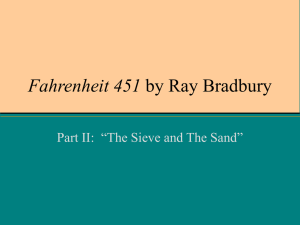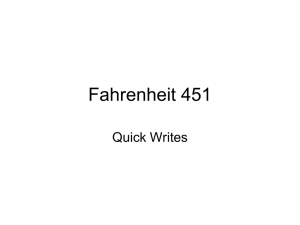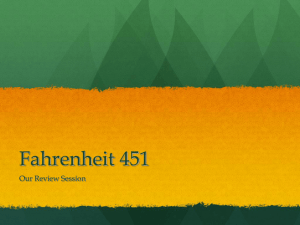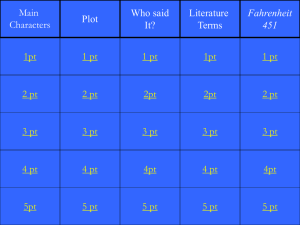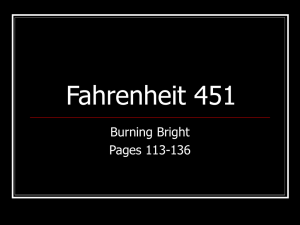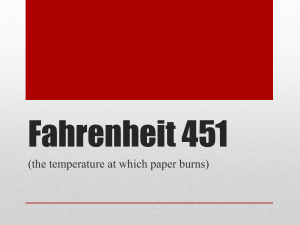Fahrenheit 452_part 2_Questions_67_88
advertisement
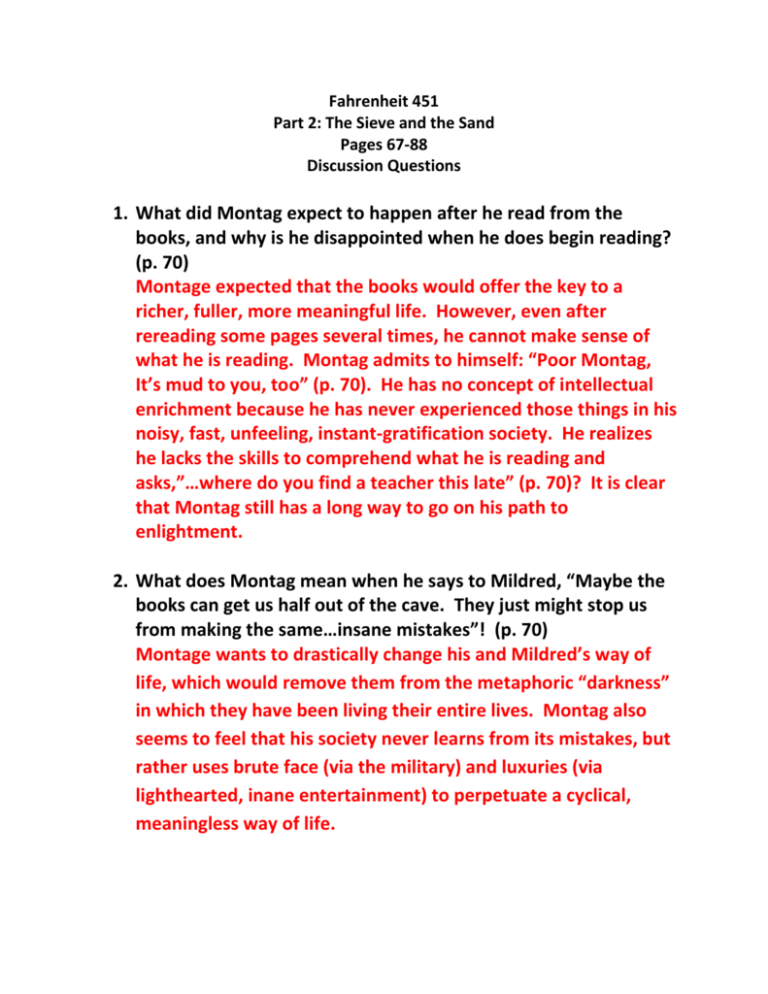
Fahrenheit 451 Part 2: The Sieve and the Sand Pages 67-88 Discussion Questions 1. What did Montag expect to happen after he read from the books, and why is he disappointed when he does begin reading? (p. 70) Montage expected that the books would offer the key to a richer, fuller, more meaningful life. However, even after rereading some pages several times, he cannot make sense of what he is reading. Montag admits to himself: “Poor Montag, It’s mud to you, too” (p. 70). He has no concept of intellectual enrichment because he has never experienced those things in his noisy, fast, unfeeling, instant-gratification society. He realizes he lacks the skills to comprehend what he is reading and asks,”…where do you find a teacher this late” (p. 70)? It is clear that Montag still has a long way to go on his path to enlightment. 2. What does Montag mean when he says to Mildred, “Maybe the books can get us half out of the cave. They just might stop us from making the same…insane mistakes”! (p. 70) Montage wants to drastically change his and Mildred’s way of life, which would remove them from the metaphoric “darkness” in which they have been living their entire lives. Montag also seems to feel that his society never learns from its mistakes, but rather uses brute face (via the military) and luxuries (via lighthearted, inane entertainment) to perpetuate a cyclical, meaningless way of life. 3. What is the significance of the jets flying overhead? (Read 11, 30 and 69) One level, the ominous sound of the jets increases suspense and injects a sense of danger, which intensifies throughout the novel. Take note on page 11 of the novel Montag hears the jets but too upset about Mildred’s overdose to think about them, on page 30 the firemen pay no attention to the sound by crying out, “Every hour so many…things in the sky!...Why doesn’t someone want to talk about it!” The jets are a reminder of the neverending war going on in the backdrop of the novel. Montage even makes the comment, “We’ve started and won two atomic wars since 2022” (p. 69)! This gives the reader a clue about the novel’s futuristic setting. Students should also not that Bradbury was writing Fahrenheit 451 at the dawn of the “atomic age” and shortly after World War II.) 4. Why do you think Bradbury hints at Montag’s stash of books and meeting with Faber but does not elaborate on either until later in the novel? (Read 8 and 17 to help you answer) The “teasers” on page 8 and 17 of the novel help create a sense of suspense regarding the ventilator grill and the meeting with a mysterious man, but neither situation is clarified until later in the novel. Montag seems realize that both keeping books and not reporting Faber were wrong. Perhaps earlier in the novel, Montage was not yet ready to admit his interest in literature, but later, as he strays further from the mindless existence he occupied before, he draws on both his hidden books and Faber for support. 5. Why do you think Faber risked giving Montag his address when they first met in the park? (Read page 21 to help you answer) Montag does not arrest or accuse him right away, which gives Faber the confidence to keep talking to a fireman. He seems to realize that Montag is not the typical fireman, much as Clarisse did, telling just doesn’t seem right for you, somehow” (p. 21). Perhaps Faber also could sense that Montag was a certain type of fireman—one who might eventually question his job duties and turn to literature for answers. Faber trusts Montag—a startling act in a society full of mistrust and paranoia. Faber might have wanted to read and preserve literature. 6. When do you think Montag began feeling “numb” to his wife and other important things in his life? (p. 73) Montag seems to think it was “the night (he) kicked the bottle in the dark, like kicking a mine (p. 73), which was the night Mildred overdosed on sleeping pills. Note that this is the same night Montag first spoke to Clarisse. It seems that once Montag became aware that there were people like Clarisse and Faber in the world, he began questioning his own life. Another possible answer is also seeing the woman burn with her books changed Montag profoundly and that could have been the moment he realized he had been “numb” to the world for a long time. 7. What is the significance of the name Faber? (p. 85) The name comes from the Latin word “faber,” meaning ingenious or skillful and usually referring to a master craftsman. In Montag’s world, a man like Faber stands out as a creator rather than a destroyer. As Faber says, “Those who don’t build must burn” (p. 85). Also note that Faber, though an intellectual, creates small electronic devices, as evidenced by the wires and other parts on the table in his home. Also, Faber was once a master of his craft—literature—and to Montag, he is certainly skilled at analyzing literature. 8. Compare Faber’s and Beatty’s opinions about current society. Upon which significant points do they agree and disagree? (p. 59 and 79). The two men both seem to agree that mass entertainment is bland trivial, that books do not inherently possess special power, that modern people lack the leisure to think, and that people stopped reading books because they wanted to—not because the government forbade it. Disagree: Beatty believes books make life difficult, whereas Faber feels books give life meaning. Beatty believes “ books say nothing” (p. 59), whereas Faber insists that books truthfully record life in vivid detail, showing the “pores in the face of life” (p. 79). Beatty condemns books for encouraging differences of opinion, whereas Faber condemns mass entertainment (parlor walls) for its sensory overload and manic pace. Beatty believes that books will leave people “lost,” whereas Faber believes books will help people find truth. 9. Do you consider Faber a coward? Why or why not? This answer is an opinion questions. You must make a statement of whether you consider Faber a coward and then support it with details from the story. Possible answers: Faber has high expectations of bravery and what this says about him is that his moral oppose those of his society. Unlike Montag, Faber has never been a man of action. Rather, he has always been an intellectual. Yet he feels guilty because he hardly protested when books began to be destroyed. He also conspires with Montag to print a new Bible and provides the set of earbuds for communication. However, Faber sees the earbuds as further proof of his cowardice, since his electronics hobby was a safe one that never put him in any real danger.

